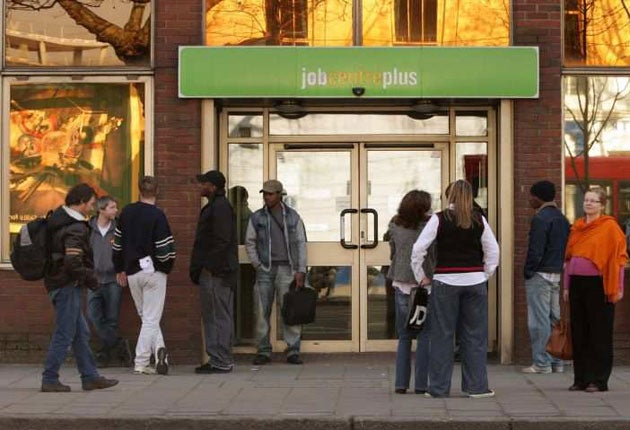
The unemployment rate increased to a near 17-year high today after another rise in the jobless total and a huge fall in public sector employment amid more grim news on jobs.
Unemployment increased by 28,000 between November and January to almost 2.7 million, while the number of people claiming Jobseeker's Allowance increased for the 12th month in a row, up by 7,200 in February to 1.6 million, the worst figure since the end of 2009.
French-based pharmaceutical firm Sanofi added to the gloom by announcing the closure of a plant in Newcastle upon Tyne with the loss of 450 jobs, while UK Coal raised the threat of closing Daw Mill mine near Coventry, the biggest in the country, jeopardising 800 jobs.
Deputy Prime Minister Nick Clegg said the rise in unemployment was "disappointing" but insisted the problem was not the fault of the coalition Government.
He told the House of Commons that it would be wrong to suggest it was a "problem invented by this Government", adding that unemployment among women and young people had risen under the Labour administration.
Deputy Labour leader Harriet Harman countered: "When we left Government, unemployment was coming down", adding that the coalition's economic policy was "not only driving up unemployment, it means they will have to borrow more". It's hurting, but it certainly is not working."
The Government said there were signs that the labour market was "stabilising", with the number of people in work increasing by 9,000 to 29.1 million, while the 28,000 increase in unemployment was the lowest for almost a year.
Other figures from the Office for National Statistics showed that public sector employment fell by 37,000 in the final quarter of 2011 to just under six million, while the numbers employed in private firms increased by 45,000 to 23 million.
Public sector employment has fallen by 270,000 in the past year following the Government's spending cuts.
Youth unemployment increased by 16,000 to reach 1.04 million, a jobless rate of 22.5%, while the number of unemployed women jumped by 22,000 to 1.13 million.
The number of people working part-time because they could not find a full-time job increased by 110,000 to 1.3 million, the highest since records began in 1992.
Part-time employment rose by 60,000 to 6.6 million, while self-employment fell by 52,000 to just over four million.
Average earnings increased by 1.4% in the year to January, down by 0.5% on the previous month.
Unison said 625 public sector jobs have been lost every day since the coalition Government was formed, equivalent to one every two minutes and 18 seconds.
General secretary Dave Prentis said: "Cuts are choking off demand in our economy and hitting the private sector hard. It cannot create enough jobs to offset public sector losses and fuel our recovery.
"The figures show that women are still being hit hardest by job losses. It's shameful to see that not only are women bearing the brunt of the recession, they are unemployed in record numbers, and are hardest hit by Tory cuts to public services and jobs."
TUC general secretary Brendan Barber said: "The rise in employment is encouraging, but the new jobs being created are mainly part-time. These jobs are not paying enough to replace the full-time earnings that people need."
Dr John Philpott, chief economic adviser at the Chartered Institute of Personnel and Development, said: "Combined with a very low rate of pay increases - which are still lagging far behind price inflation - the emergence of 'part-time Britain' shows that, even though the rise in unemployment may be slowing, there is an increasingly tight squeeze on most people's standard of living."
Neil Carberry, the CBI's director for employment policy, said: "While unemployment has risen again, thankfully the pace of increase has continued to slow, as we have seen in previous months.
"Overall employment remained broadly flat over the past three months, but it's encouraging that private sector jobs rose in the last quarter of 2011. During that period, private sector jobs more than compensated for the losses in the public sector."
The UK's unemployment rate is now 8.4%, up by 0.1% from the previous quarter, the highest since the end of 1995.
Unemployment in the regions between November and January was:
Region Total Change on Unemployment
unemployed quarter rate
North East 138,000 minus 11,000 10.8%
North West 317,000 plus 16,000 9.3%
Yorkshire/Humber 261,000 plus 9,000 9.8%
East Midlands 187,000 plus 5,000 8.2%
West Midlands 241,000 minus 1,000 9.1%
East 208,000 minus 10,000 6.8%
London 433,000 plus 11,000 10.2%
South East 287,000 plus 14,000 6.5%
South West 169,000 minus 8,000 6.3%
Wales 134,000 plus 1,000 9.1%
Scotland 234,000 plus 6,000 8.7%
Northern Ireland 56,000 minus 4,000 6.5%
PA
Subscribe to Independent Premium to bookmark this article
Want to bookmark your favourite articles and stories to read or reference later? Start your Independent Premium subscription today.

Join our commenting forum
Join thought-provoking conversations, follow other Independent readers and see their replies